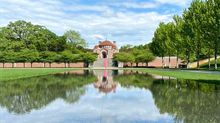How do I research loved ones buried at Lakewood?
- lakewoodcemetery
- Feb 18, 2021
- 4 min read
Updated: Feb 26, 2021
All month on our Facebook page, we’ve been answering your “Ask Lakewood” questions. Every year, people are curious about how they can research relatives buried at Lakewood. We love finding out the stories behind the individuals laid to rest here at Lakewood, and we’re so glad when the cemetery can be a resource for people to learn about family and local histories. So in this month’s blog, we’re providing you with a bit of a guide.

Lakewood Cemetery
At Lakewood
Lakewood is fortunate in that even our earliest founders kept thorough records of every burial, cremation, and memorialization. Today, on Lakewood’s website, we have a Burial Search tool that allows you to look up the memorial location of anyone who was buried, cremated, or had their ashes scattered at Lakewood. In your search results, you’ll also find directions to the memorial site. If you would like to see a list of others who are buried in the same plot, you can do so by clicking on the hyperlinked burial location information; it will bring you to a new page of search results based on that burial area.
You can access our Burial Search search tool on your home computer, or via our mobile app—which can guide you directly to the grave via GPS. Lakewood also has an Information Kiosk, located on the lower level of the Administration Building’s left side. (The Administration Building is the large building you see upon entering.) Here you will find an electronic kiosk with the search tool, from which you can print out directions. The Information Kiosk is open whenever the cemetery gates are open. During the building’s open hours, a member of Lakewood’s staff can also help you locate a grave. (We respectfully ask that you please wear a mask indoors.)

The Administration Building at Lakewood
In order to learn more about the individuals buried at Lakewood, we turn to local and national archives and libraries. There are great, free resources available through the Hennepin County Library, the Minnesota Historical Society, the Library of Congress, and more.
Vital Records and Black American Genealogy
The Minnesota Historical Society has an online records search, which has birth and death records, as well as census records and more, for people in Minnesota. There are also national census records available through the National Archives (through 1940). These sources are free, but those looking for a single, consolidated website that holds this and other information could consider purchasing a membership to Ancestry.com. The Hennepin County Library also has a subscription to Ancestry.com, which can be accessed from home during the pandemic, and at branch libraries during non-pandemic times.
Because of this nation’s cruel history of slavery, many Black Americans did not have the privilege of having records of their families kept prior to the Civil War. However, the Minnesota Historical Society has a webpage with tools specific to finding African American family histories. Additionally, a large national project called Enslaved: People’s of the Historical Slave Trade was recently launched. The project amasses information about the individuals and experiences of both enslaved people and those who perpetrated the slave trade. The website BlackPast has also compiled national resources for African American genealogy.
City Directories
If you’re looking for address and business information for someone who lived in Minneapolis, Edina, Hopkins, or St. Louis Park, you can also look at the Hennepin County Public Library’s collection of City Directories. These directories stretch back to the mid-1800s, and can help you locate addresses and employment information for residents. We love these directories because they are text searchable and all you need is a Hennepin County Library Card. The St. Paul Public Library has also digitized St. Paul City Directories. (Genealogy tip: try a few different possible spellings of names, and be sure to try maiden names, too.)

The Minneapolis City Directory from 1865-1866. Source: Hennepin County Library
Local and National Newspapers
Another great way to learn about individuals is through local newspapers. Newspapers can help you find announcements and accomplishments. Many local newspapers (even some that no longer exist) are digitized online. The Minnesota Historical Society has a partial historic newspaper database for the state of Minnesota available online. They also have more information about many of the Twin Cities’ influential Black-owned newspapers.

Campfire Girls reading newspapers in 1927. Source: Minnesota Historical Society
You can also find many of the nation’s newspapers available for searching through the Library of Congress’s Chronicling America project. The above databases are searchable by text and date. They are also free. These databases are most helpful if you are looking for newspaper articles published before the copyright went into effect in 1922. However, if you want to find more recent newspaper articles, you can reach out to newspapers directly to ask about their archives. We also recommend considering a paid subscription to Newspapers.com—the world’s largest online newspaper archive.
The Minnesota Historical Society has also amassed an informal collection of notable headlines from Twin Cities Black-owned newspapers, with headlines of articles—including many that were published decades after the copyright went into effect in 1922.
Photos, Articles, Oral Histories, and More
The Hennepin County Public Library also has many other great collections, including yearbooks (with pictures!), postcards, and a variety of different photo archives. The Minnesota Digital Library also has images and other sources compiled from almost 200 participating organizations across the state, including other local museums and libraries. The Minnesota Historical Society is a great resource for articles, as well as photographs.
Many of these resources are available online, with an easy search function.

News photographer George Luxton in 1935. Source: Minnesota Historical Society
Lastly, the Minnesota Historical Society also has a great database of oral histories. Their oral history collection includes many interviews with immigrants to Minnesota. They also have transcriptions, so you can search the text of the interview with the individual.
Lakewood as a Resource
Lakewood is proud that we have used our Facebook page to share information about hundreds of individuals buried here. Of course, you can always use the search function on our Facebook page to see if you can find someone specific. And if you've got a story to tell us, stay tuned! In the coming months we'll be announcing a new way for you to share your Lakewood story with the community.
We hope these resources help you find out more about your family and local history!
Read more about Lakewood and the early days of Minneapolis













































Comentarios